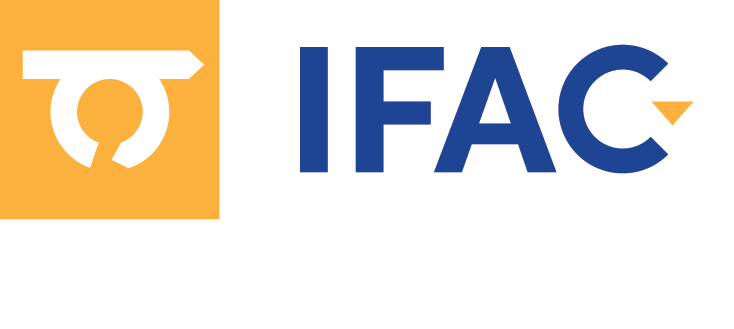
 AAC 2022
10th IFAC International Symposium on Advances in Automotive Control
AAC 2022
10th IFAC International Symposium on Advances in Automotive ControlAugust 28-30, 2022 | Columbus, Ohio, USA

 AAC 2022
10th IFAC International Symposium on Advances in Automotive Control
AAC 2022
10th IFAC International Symposium on Advances in Automotive ControlAugust 28-30, 2022 | Columbus, Ohio, USA |
Plenary Lectures |
|
Monday, August 29
|
|
Abstract: Real-time avoidance maneuvers have been developed using a force-centric perspective, where the founding principles are obtained from studies of optimal maneuvers. The developed optimization framework, the different criteria used, and the obtained solutions give insight into how to control the forces on the vehicle. A highlight in this presentation is the first algorithm not needing a tire-road friction estimate. |
|
Biography: Lars Nielsen received his M.Sc. in engineering physics in 1979 and his Ph.D. degree in automatic control in 1985, both from Lund University. He has taught at Linköping University since 1992, where he was appointed Sten Gustafsson chair in vehicular systems. Nielsen was the 2013 recipient of the Håkan Frisinger Award, a prize of the Volvo Research and Educational Foundations Professor Nielsen’s main research interests are in automotive modeling, control, and diagnosis. |
|
|
|
Tuesday, August 30
|
|
Biography: Prof. Anna Stefanopoulou, is the William Clay Ford Professor of Technology at the University of Michigan. She was an assistant professor at the University of California, Santa Barbara, a visiting professor at ETH, Zurich, and a technical specialist at Ford. She earned her diploma in Naval Architecture and Marine Engineering (91, NTUA, Athens), her PhD in Electrical Engineering (96, UMICH, Ann Arbor). She is a Fellow of the ASME (08), IEEE (09), and SAE (18) and has received multiple awards from these technical societies. She has one book, 21 US patents, 400 publications (7 of which have received awards) on estimation and multivariable control of engines, fuel cells, and batteries. |
|
|
|
Wednesday, August 31
|
|
Abstract: The team has made some discoveries that enable commercial vehicle emissions and fuel consumption reductions through use of diesel engine variable valve actuation (VVA) via control of the gas exchange process. These findings were cited in 2020 by both the California Air Resources Board (CARB) and the EPA with respect to the benefits and reasonableness of stricter emission standards for heavy-duty engines that CARB has now finalized, and that EPA continues to pursue. The group has also helped advance truck platooning technology via model-based control. The effort-to-date demonstrates 13% fuel and CO2 reductions on hilly terrain, and in so doing demonstrated that platooning can likely be extended to more freight routes, and possibility to automated truck following, as well. The team also develops hybrid-electric powertrain and engine control strategies for commercial vehicles used in both on- and off-road applications. Results from all of these efforts will be summarized in the talk, which will include discussion of the essential role that control engineering plays in all of them. |
|
Biography: Professor Greg Shaver’s research program is dedicated to clean, safe, and efficient commercial vehicles – via advanced diesel, biofuel & natural gas engine systems/controls/electrification, powertrain electrification, and vehicle automation/connectivity. Greg's students have published more than 130 peer-reviewed journal and conference papers. Greg has directed the research efforts of more than 140 current/former Purdue students (64 graduate, 81 undergraduate). Of his 50 former graduate students (20 PhD, 30 MSME) one-fourth are women, more than half are now working at industry partner companies, and two are tenure-track faculty (1 assistant, 1 associate). Greg was named a Fellow of SAE and ASME in 2021 and 2020, respectively. Purdue University named him a University Faculty Scholar and the Early Career Excellence in Research Awardee in 2014, the 2016 Spira Awardee for Fostering Excellence in Commercial or Defense Product Realization, and the Faculty Excellence Awardee for Impact on Industry and the Discovery in Mechanical Engineering awardee in 2022. He was also elected to the Purdue University Innovator Hall of Fame in 2014. Prof. Shaver has received more than $20M in research funding from sources including ARPA-E, DOE, Cummins, Deere, Eaton, NSF, EPA, Allison and Caterpillar, pointing to broad support from both industry and government. Greg earned graduate (PhD 2005, MSME 2004) and undergraduate (BSME 2000 w/ highest distinction) degrees from Stanford and Purdue, respectively. His research is currently funded by DOE, Cummins, Eaton, Deere, ONR, and Allison. |